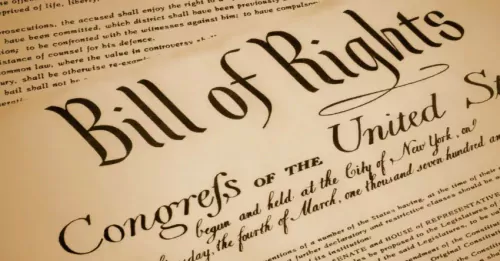
Introduction:
The United States of America is a country known for its vast and complex legal system, consisting of a myriad of rules and regulations. Whether you are a resident, a business owner, or simply a visitor, understanding and adhering to these laws is crucial. In this blog post, we will explore the key rules and regulations that shape various aspects of life in the USA. By gaining a better understanding of these legal frameworks, you will be better equipped to navigate them successfully.
Constitution and the Bill of Rights:
The foundation of the US legal system is the Constitution, which outlines the fundamental principles and rights of its citizens. The Bill of Rights, the first ten amendments to the Constitution, guarantees crucial freedoms such as freedom of speech, religion, and the right to a fair trial. Familiarizing yourself with these constitutional rights is essential for understanding the broader legal landscape.
The Constitution and the Bill of Rights are two foundational documents that form the basis of the legal system in the United States. They outline the fundamental principles, rights, and freedoms of the American people. Here's an overview of the Constitution and the Bill of Rights:
The Constitution: The Constitution of the United States is the supreme law of the land. It was adopted on September 17, 1787, and outlines the framework for the federal government and its three branches: the legislative branch (Congress), the executive branch (the President), and the judicial branch (the courts). The Constitution provides a system of checks and balances to ensure that no single branch of government becomes too powerful.
The Constitution also establishes the division of powers between the federal government and the state governments, known as federalism. It grants certain powers to the federal government while reserving other powers to the states. The Constitution can be amended through a specific process outlined in Article V, allowing it to adapt to the changing needs and values of society.
The Bill of Rights: The Bill of Rights refers to the first ten amendments to the Constitution, which were added shortly after its ratification in 1789. These amendments were designed to protect individual liberties and limit the power of the federal government. The Bill of Rights guarantees essential freedoms and rights that are considered fundamental to American democracy.
Some key provisions of the Bill of Rights include:
- First Amendment: Protects freedom of speech, religion, press, assembly, and the right to petition the government.
- Second Amendment: Protects the right to bear arms.
- Fourth Amendment: Protects against unreasonable searches and seizures.
- Fifth Amendment: Guarantees due process of law, protection against self-incrimination, and prohibits double jeopardy.
- Sixth Amendment: Ensures the right to a fair and speedy trial, the right to confront witnesses, and the right to legal counsel.
- Eighth Amendment: Prohibits cruel and unusual punishment and excessive bail.
It's important to note that the Constitution and the Bill of Rights lay the foundation for individual rights and liberties, but they are not exhaustive. Additional amendments and court interpretations have expanded upon these rights and addressed contemporary issues over time.
The Constitution and the Bill of Rights serve as a safeguard to protect citizens' rights and ensure a balance of power within the government. They are integral to the American legal system and the principles of democracy that the nation upholds.
Federal Laws:
Federal laws apply to the entire nation and cover a wide range of issues, including civil rights, taxation, immigration, and commerce. Some notable federal laws include the Civil Rights Act, the Americans with Disabilities Act, the Clean Air Act, and the Federal Tax Code. Understanding these laws is crucial for compliance and ensuring that you operate within the legal boundaries.
State Laws:
In addition to federal laws, each state within the USA has its own set of laws that govern specific areas not covered by federal regulations. These state laws can vary significantly from one state to another. They cover areas such as criminal law, family law, education, and transportation. It's important to familiarize yourself with the laws specific to the state you are in or plan to visit.
Administrative Regulations:
Various government agencies at the federal, state, and local levels create administrative regulations to implement and enforce laws. These regulations provide specific guidelines and requirements that individuals and businesses must follow. For instance, the Food and Drug Administration (FDA) sets regulations for food safety, while the Environmental Protection Agency (EPA) establishes regulations to protect the environment.
Employment Laws:
The USA has comprehensive employment laws that safeguard the rights of employees. These laws cover areas such as minimum wage, overtime pay, workplace safety, anti-discrimination, and employee benefits. Important federal employment laws include the Fair Labor Standards Act (FLSA), the Occupational Safety and Health Act (OSHA), and the Equal Employment Opportunity Commission (EEOC) guidelines.
Business Regulations:
Running a business in the USA involves complying with various rules and regulations to ensure fair competition and protect consumers. These regulations cover areas such as licensing, permits, intellectual property rights, advertising, and consumer protection. Understanding business regulations at the federal, state, and local levels is crucial for entrepreneurs and business owners.
Conclusion:
Navigating the rules and regulations in the USA can be complex, but understanding them is vital for individuals, businesses, and visitors alike. The Constitution, federal laws, state laws, administrative regulations, employment laws, and business regulations shape the legal landscape in the USA. By familiarizing yourself with these laws, you can ensure compliance, protect your rights, and contribute to a fair and just society. Remember, seeking legal counsel or guidance when necessary can help you navigate any uncertainties and ensure you operate within the boundaries of the law.








